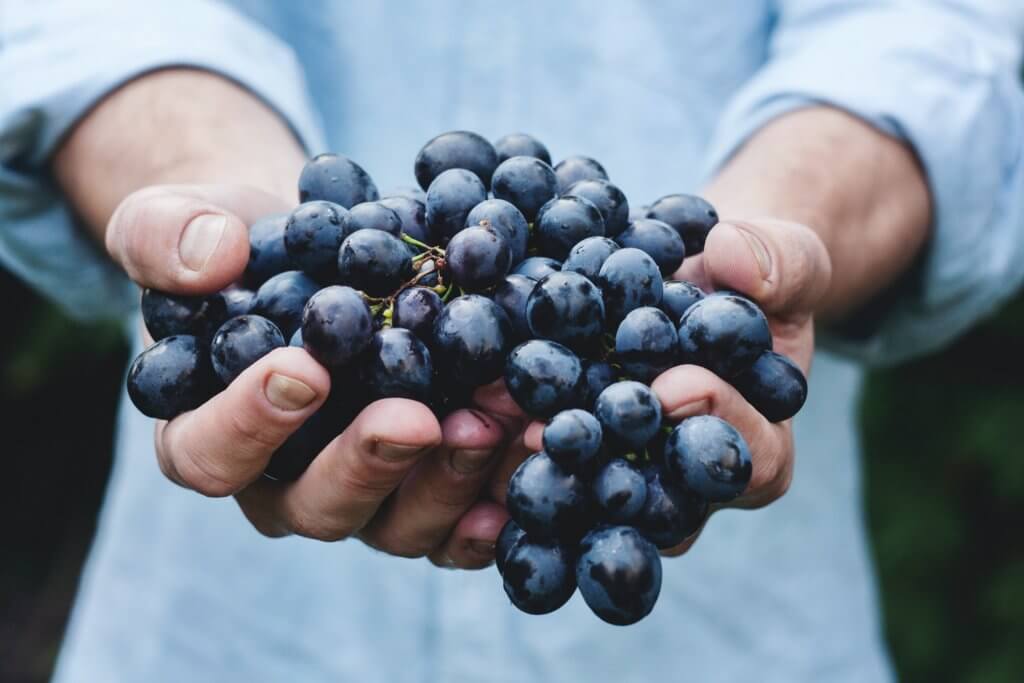GAINESVILLE, Fla. — The muscadine grape is native to the Southeastern United States, and often described as a “super fruit” thanks to its high levels of polyphenols and ellagic acid. Now, new research reveals that wine produced with muscadine grapes may also help improve aging skin. Scientists at the University of Florida report women who drank two glasses of dealcoholized muscadine wine on a daily basis showed notable improvements in both the elasticity and water retention of their skin in comparison to others consuming a placebo.
This project marks the first time ever that scientists have studied the influence on nonalcoholic wine consumption on skin health using a randomized clinical trial. Study authors theorize the observed beneficial effects are tied to chemical compounds known as polyphenols that naturally occur in many plants.
“Muscadine grapes have been found to have a unique polyphenolic profile in comparison to other red wine varieties,” says Lindsey Christman, PhD, who conducted the research with Liwei Gu, PhD, professor of food chemistry and functional food at the University of Florida, in a media release. “Our study suggests that muscadine wine polyphenols have potential to improve skin conditions, specifically elasticity and transepidermal water loss, in middle aged and older women.”
Muscadine grapes have been used to make wine for hundreds of years. Previous clinical trials already suggest that the polyphenols found in muscadine wine – including anthocyanins, quercetin, and ellagic acid – likely help diminish inflammation and oxidative stress.

For this latest study, researchers recruited 17 women between the ages of 40 and 67 and randomly assigned them to either drink dealcoholized wine or a placebo beverage that looked and tasted similar but did not contain any actual polyphenols. The women drank 300 milliliters or about 10 ounces (equal to roughly two glasses of wine) of their assigned beverage each day for a total of six weeks. Then, after taking a three-week break, participants switched to the opposite beverage for another six weeks.
The research team made sure to measure participants’ skin conditions and markers of inflammation and oxidative stress both at the beginning of the study and at the end of each six-week time period. They discovered that drinking muscadine wine appears to significantly improve skin elasticity. Loss of elasticity is what causes our skin to sag more as we grow older. Moreover, the wine was associated with a decrease in water loss at the skin surface, a measurement believed to indicate the skin is providing a more effective barrier against damage.
Study authors did not note any significant differences in the amount of wrinkles on the skin. The women, however, displayed improvements in skin smoothness and less evidence of inflammation and oxidative stress in comparison to baseline. Still, there were no significant differences in these factors between dealcoholized muscadine wine and the placebo beverage.
“This cross-over study demonstrated that six weeks of dealcoholized muscadine wine consumption resulted in improvement of certain skin parameters associated with aging, such as elasticity on the forearm and barrier function of the skin on the face, when compared to baseline and placebo,” Prof. Christman explains. “This is likely due to decreases in inflammation and oxidative stress.”
Considering this project only involved 17 people, repeating these efforts with a larger and more diverse group of people would help to confirm and strengthen these findings. Also, most commercially-available muscadine wine contains alcohol. Researchers caution that drinking wine with alcohol may produce different results.
“We used dealcoholized muscadine wine because we were interested in the effect of the bioactive compounds in wine, specifically the polyphenols, on skin health,” Prof. Christman concludes. “Alcohol would add another variable to the study that may cause the effects to be different. In addition, the dealcholization process may alter the chemical composition.”
The team presented their findings at NUTRITION 2023, the annual meeting of the American Society for Nutrition.
You might also be interested in:
- Best Summer Mocktails: Top 5 Booze-Free Drinks, According To Mixologists
- Your favorite wine could be wiped out by climate change
- Best Skin Tightening Cream: Top 5 Firming Lotions Most Recommended By Experts
